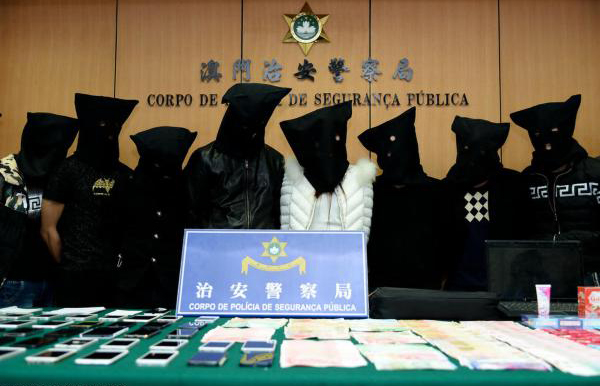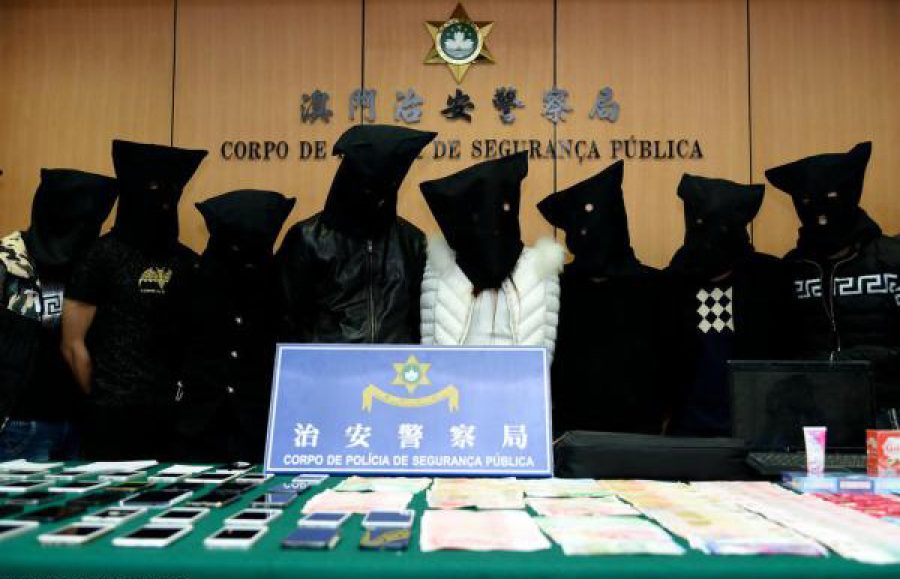The Judiciary Police (PJ) have busted a gang which in 2014 started to run a prostitution racket in a spa in Taipa and during the weekend operation PJ officers arrested 13 suspected gang members and took 151 people in for questioning, PJ spokesman Lai Man Vai announced during a special press conference Tuesday.
The 151 people who were taken in for questioning included prostitutes, sex service clients, a doctor and a nurse, according to Lai, who said that the doctor and nurse had carried out medical examinations of the prostitutes controlled by the gang. All the gang’s prostitutes were required to undergo regular check-ups at a local clinic, Lai said.
The gang, headed by mainlanders, had earnt over HK$300 million from at least 95,000 sex service transactions since 2017, Lai said.
The Judiciary Police were recently tipped off that a gang was running a prostitution racket in a spa in Taipa and launched an investigation.
During the investigation, PJ officers discovered that the gang, in collaboration with local pimps and pimps from the mainland and elsewhere, arranged for women from various places, primarily from the mainland as well as Southeast Asian and Eastern European countries, to come to Macau to work as prostitutes in the spa, according to Lai, who said that the gang’s “division of labour” was based on a clearly defined hierarchy.
“The gang used the spa as a cover for its prostitution services,” Lai said.
Some local media identified the spa as JYS Spa in Rua de Chiu Chau in Taipa.
According to Lai, the prostitutes were required to buy items used for sex services such as condoms, lubricants and mouthwashes provided by the gang. The prices paid by clients for each sex service provided ranged between about 2,588 and 4,488 patacas, depending on the ratings given by key members of the gang based on the respective prostitute’s age, looks and figure, Lai said, adding that each prostitute was paid less than 1,000 patacas for each sex service.
According to Lai, the gang also required its prostitutes to have sex with its pimps free of charge as a way of testing their sex skills.
Lai said that the gang also required its sex workers to undergo regular check-ups at a clinic in the city centre for which they needed to pay. The clinic paid some of the check-up fees paid by the prostitutes back to key members of the gang as “commission”, according to Lai. The gang banned prostitutes who refused to submit to a check-up at the clinic from working for it, Lai said.
For some of the prostitutes from Vietnam, the gang applied for non-resident worker permits (“blue cards”) so that they could stay in Macau as non-resident workers in fictitious jobs such as chefs, masseuses, cleaners and even domestic helpers, according to Lai, who said the gang arranged the work permits as a way to extend the amount of time the women could stay in Macau and avoid possible police investigations.
In the weekend raids that lasted for 18 hours, about 200 PJ officers busted 13 locations across the city, including the spa, the clinic and residential units where the suspected gang members were staying, according to Lai, who said that 13 male and female suspected gang members – nine locals, two mainlanders and two Vietnamese – were arrested and 151 people were taken in for questioning – comprising 58 male and female staff members of the spa, 58 female prostitutes, 29 sex service male clients, two taxi drivers, the doctor, the nurse, and another two people. Lai did not elaborate on the two other people.
Lai said that the police were still looking for the heads of the prostitution gang and other gang members.
Lai said that the gang had set up various anti-investigation measures at the spa, such as “secret” passages and “secret” rooms.
According to Lai, the gang always posted two or three people at the spa entrances, staff areas and main corridors to act as lookouts around the clock, and when they spotted police officers near the property, they would activate alarms to tell the prostitutes providing sex services at that moment to hide in the “secret” rooms.
Lai said that PJ officers had to conduct thorough searches before they discovered the hidden doors leading to the “secret” rooms. He also said that during the police operation, about 40 people were found in the “secret” rooms.
According to Lai, PJ officers seized cash equivalent to over six million patacas at the spa and in the residential flats of some of the suspected gang members. They also seized over 4,500 condoms as well as a quantity of lubricants, lingerie and sex-service paraphernalia. PJ officers also seized a large number of medical records from the clinic involved in the case, Lai said.
The Judiciary Police have also frozen several bank accounts in which money equivalent to two million patacas was deposited, Lai said.
Lai said that the suspects would be transferred to the Public Prosecution Office (MP) for further questioning, facing a range of charges such as pimping and membership of a criminal organisation.
While prostitution is not illegal in Macau, living off the earnings of a prostitute is a crime. Tourists working as prostitutes breach their condition of stay as visitors are not allowed to engage in gainful employment.(Macaunews)






